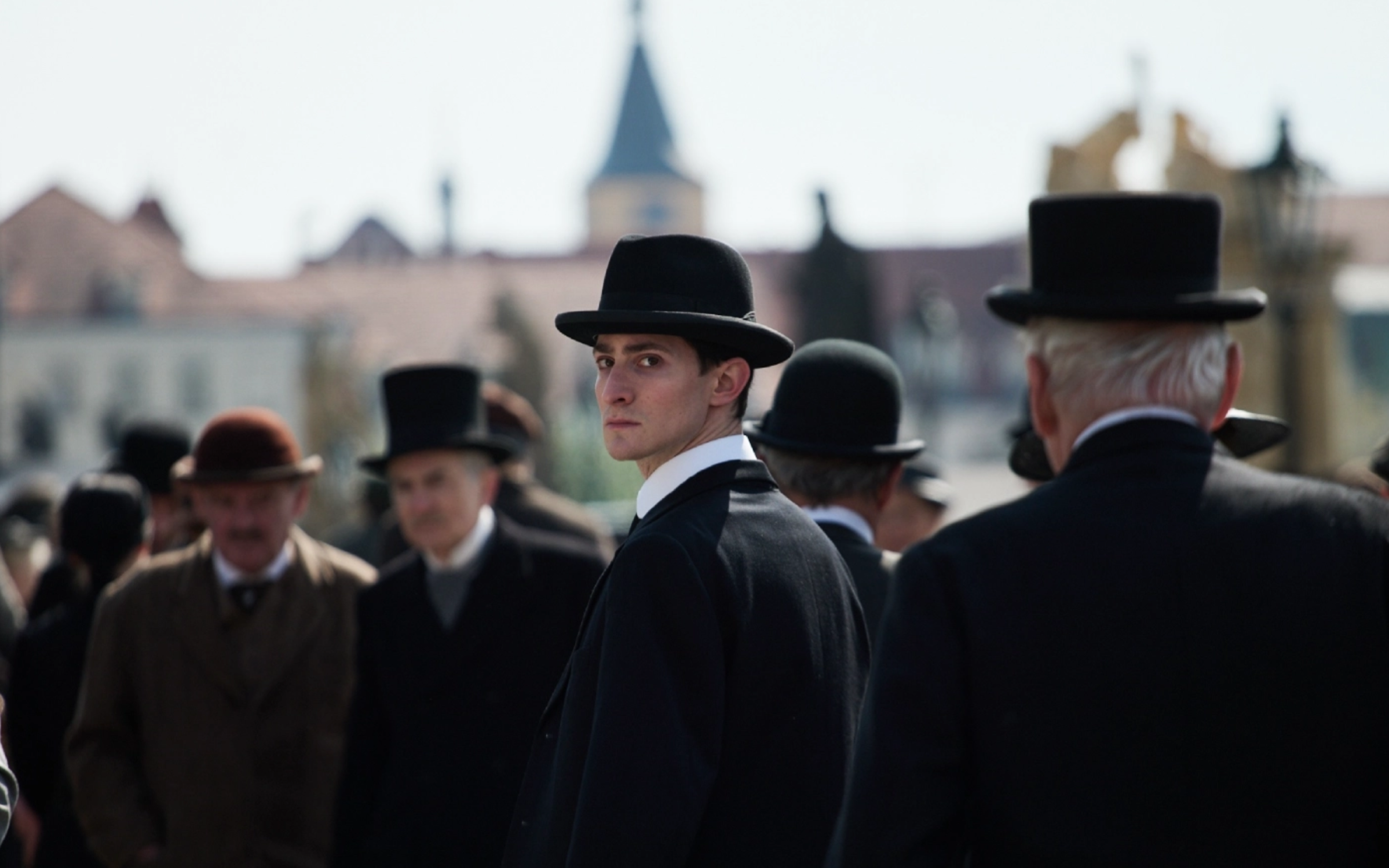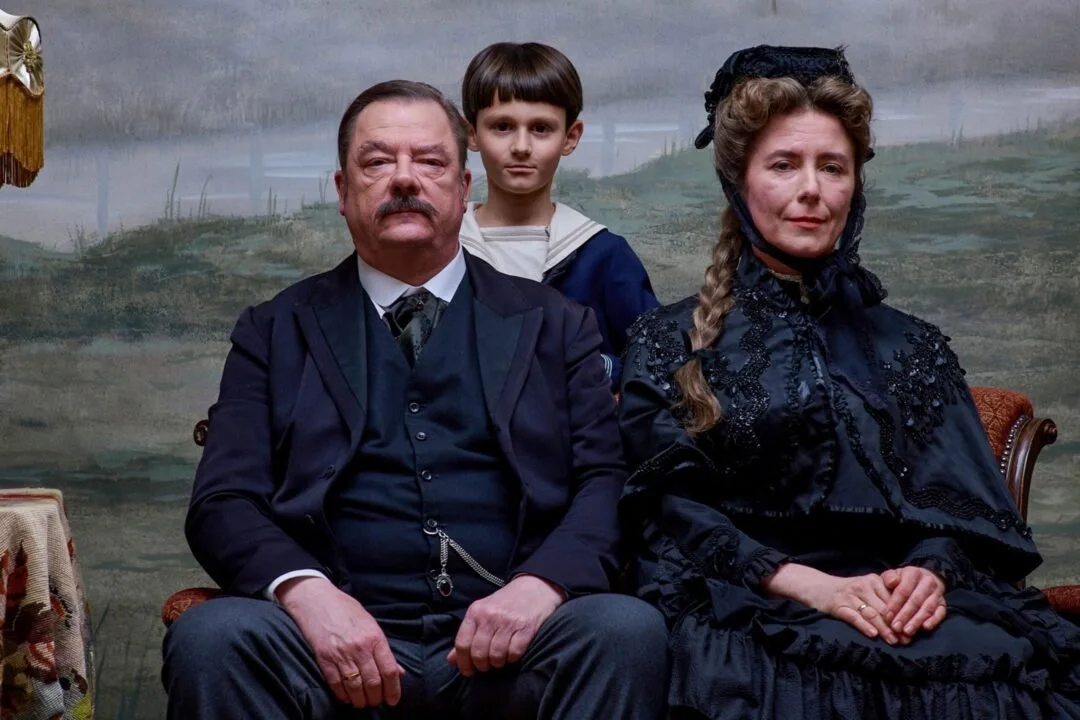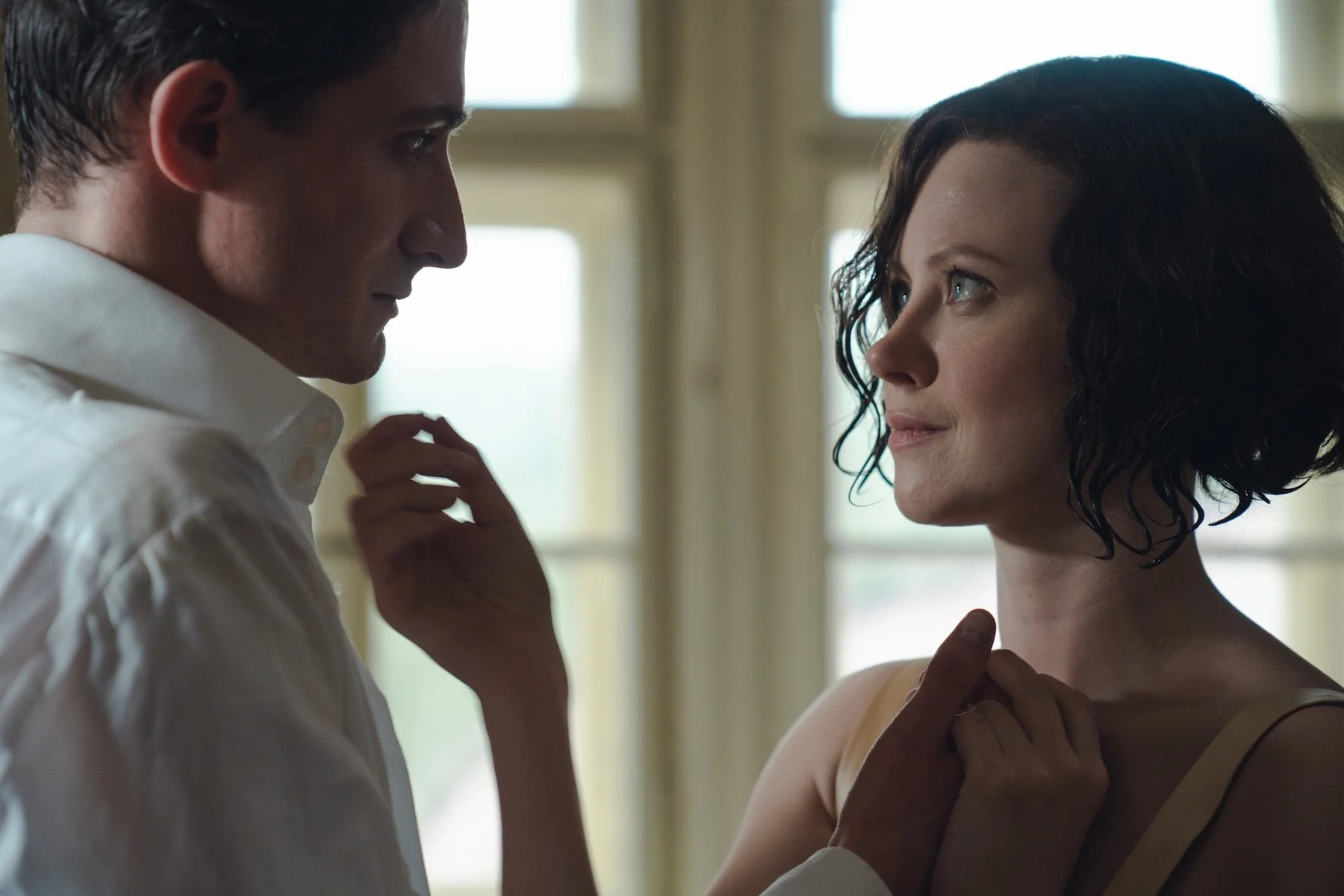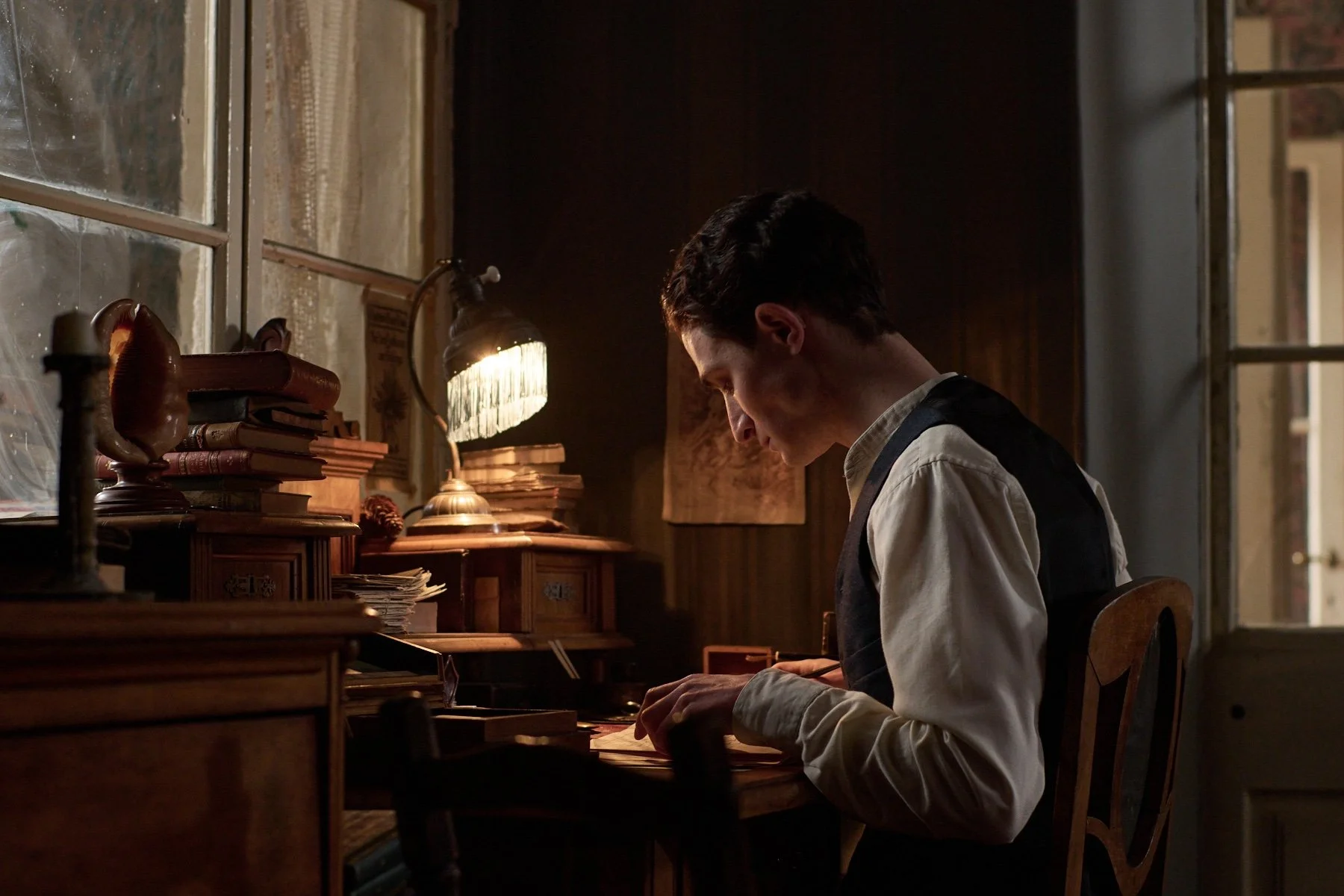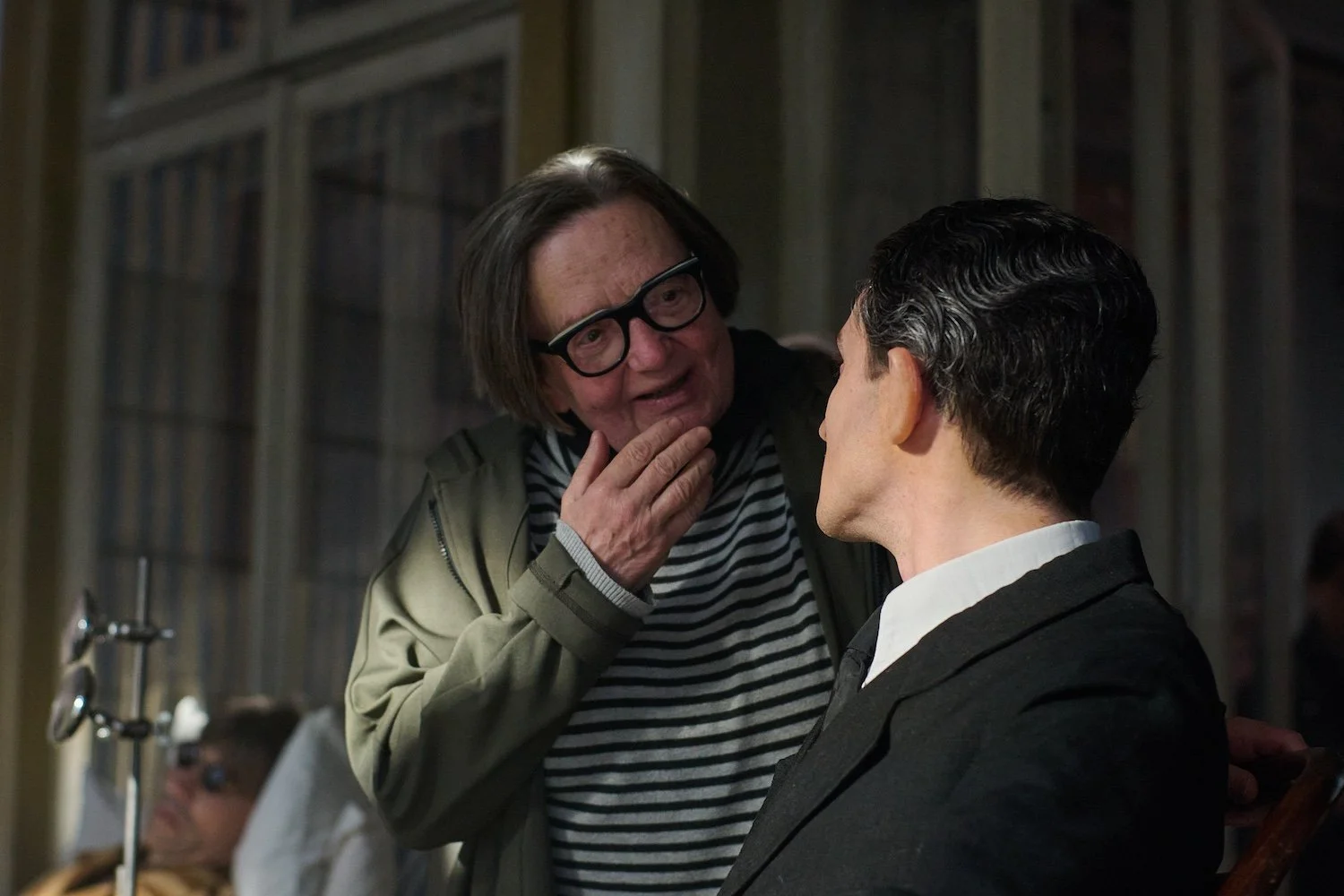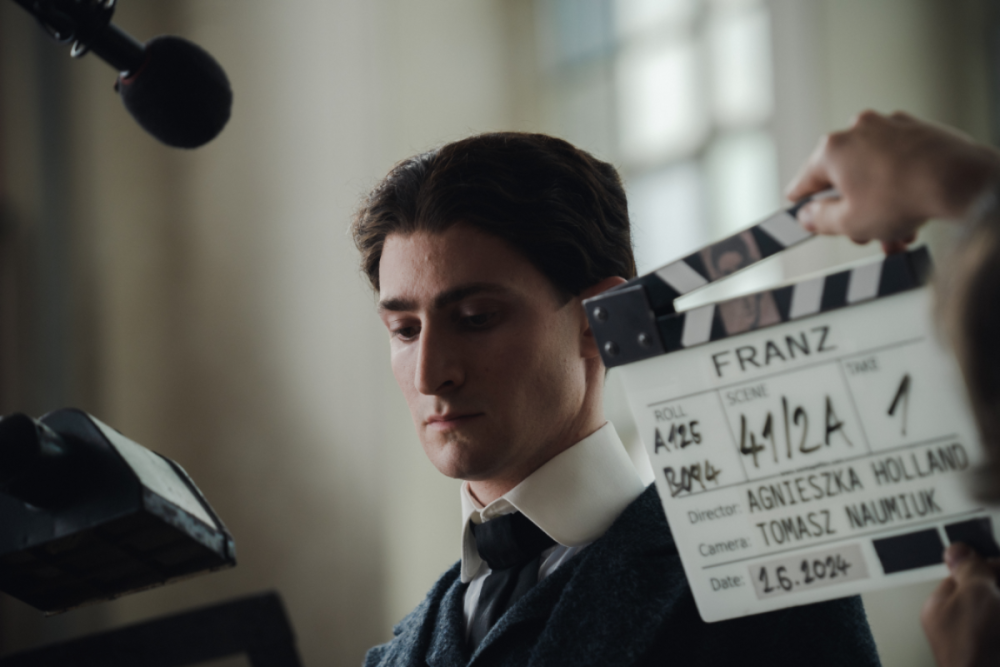Finding Franz: Agnieszka Holland’s Kafka Biopic is an Ethereal Masterpiece
Idan Weiss stars as Franz Kafka in “Franz”
There are historical figures who live in books, and then there are those who live in the very air we breathe. Franz Kafka is one of the latter. His spirit haunts the cobblestones of Prague, his anxieties echo in the architecture of modern life, and his yearning for connection is a ghost that sits with anyone who has ever felt like a stranger in their own skin. To capture such an elusive, complex soul on film is not merely a challenge; it is a monumental act of translation.
With her new biopic, Franz, the masterful Director Agnieszka Holland has not just translated Kafka—she has channeled him. This film, produced by Šárka Cimbalová and Agnieszka Holland, is a dizzying, beautiful, and profoundly moving experience that succeeds where many others have faltered, offering a portrait that is as ethereal and unsettling as the man himself.
Walking out of Kino Světozor on 25 September 2025 in Prague, the city Kafka called his “little mother with claws,” I felt a sense of disorientation, as though I had spent the last two hours in a waking dream. This is not a conventional biopic. It does not plod through a checklist of biographical events. Instead, Holland, alongside screenwriter Marek Epstein, weaves a fragmented, impressionistic tapestry that mirrors the very nature of Kafka’s mind.
The film toggles between past and present, between stark reality and surrealist fancy, creating a cinematic language thanks to Tomasz Naumiuk that is, for lack of a better word, truly Kafkaesque. It is a work that, as Holland herself has stated, aims to “give him light and some punk infusion,” and it succeeds brilliantly. The film doesn’t just show us Kafka’s life; it invites us to feel it.
Hermann Kafka (Peter Kurth), Julie Kafka (Sandra Korzeniak), and young Franz Kafka (Daniel Dongres)
The film’s opening scenes pull us immediately into the complexities of Kafka’s family life, setting the stage for an intimate exploration of his relationships and the pressures he faced. Holland skillfully juxtaposes tender, fleeting interactions with his family against the oppressive weight of his father’s expectations, a mother, Julie (Sandra Korzeniak), who could not attend to his needs as she was often too busy catering to Hermann (Peter Kurth), immersing the audience in the emotional turbulence that shaped his inner world. This approach not only contextualizes Kafka’s creative struggles but also draws a clearer line between his personal experiences and the themes that permeate his works.
At the heart of this mesmerizing achievement is Idan Weiss, whose portrayal of Franz Kafka is nothing short of otherworldly. Weiss possesses a timeless elegance and a palpable fragility that seem directly drawn from Kafka’s own photographs, works, and letters. But this is no simple impersonation. There is an eerie, irresistible quality to his performance that goes far beyond physical resemblance. Weiss becomes a vessel, and through him, we feel the tremors of Kafka’s inner world—his crippling self-doubt, his flashes of mischievous humor, an overwhelming sense of misophonia, his desperate longing for love, and his profound alienation.
One is reminded of butoh, the Japanese dance form where the performer empties themselves to become a conduit for something primal and unspoken. Weiss seems to tap into a similar energy. His movements are precise yet imbued with a sense of unease, his silences more potent than any dialogue. He doesn't just act as Kafka; he makes us feel Franz with him. It is a performance of such haunting intimacy that you forget you are watching an actor. You feel you are in the presence of the man himself, witnessing the quiet torment and incandescent brilliance that defined his existence.
Idan Weiss as Franz Kafka and Jenovéfa Boková as Milena Jesenská
Weiss dances us through a liminal space that feels as though it exists outside of time and place, an ephemeral yet palpable realm where the boundaries of Kafka's life and work dissolve into a multiverse of imagination, horror, angst, desire, and passion. His movements, fluid yet fragmented, conjure Kafka’s labyrinthine inner world with startling clarity. Weiss seems to embody more than just the man; he becomes an extension of Kafka’s psyche, allowing the audience to traverse the emotional and intellectual terrain that once consumed the writer. The choreography evokes Kafka's inner conflicts—his yearning for love and connection clashing against an overwhelming sense of alienation and existential dread.
Moments of sharp, jarring motions mirror the jagged edges of Kafka's horror, while softer, almost imperceptible gestures suggest the gentle yet unrelenting tide of desire and longing. Weiss does not impose a fixed narrative on Kafka's world; instead, he compels us to inhabit it with him, reveling in its fluidity and contradictions. The performance blurs the lines between the physical and the metaphysical, inviting us to experience Kafka not simply through his words but through the evocative physicality of dance, drawing us deeper into a space where creativity and torment intertwine with breathtaking intensity. It is as though Weiss has opened a door to Kafka’s multiverse, and rather than merely peering inside, we find ourselves swept into its haunting labyrinth, compelled to feel every flicker of brilliance and every shadow of despair that defined Kafka’s unique existence.
Photo Courtesy of Marlene Productions
As an avid, self-proclaimed Kafka nerd, processing those two hours in the cinema struck me in the midst of my own ongoing Kafka-inspired oeuvre, shaking me to my core and resonating with me not only as an artist and an author but as a person navigating the intangible weight of various contemporary crises. Kafka’s works manage to evoke the unnerving feeling of being out of place in a world that often feels overwhelming and inhumane, a sentiment that I, like many, find achingly familiar. His narratives distill the human struggle with bureaucracy, identity, and the crushing sense of invisibility—or worse, the wrong kind of visibility—all while capturing moments of breathtaking vulnerability.
What makes Kafka so profoundly relevant even today is his ability to reflect our inner landscapes without offering tidy resolutions or false reassurances. It is not important to label Franz Kafka, as any neatly packaged box would likely feel like another coffin—something his stories and diaries consciously reject. Rather, Kafka’s enduring legacy arises from the raw sensitivity of his observations, the way he seemed to feel too much in a world too absurd, and the relentless processing of those feelings that poured out into his works.
He connects so deeply with readers because he tapped into universal fears and truths, wrapped in surreal, often nightmarish, settings that feel eerily prescient in today’s hyper-mechanized, impersonal world. Ultimately, Kafka wasn’t just writing stories—he was leaving behind fragments of a soul overwhelmed yet burning with the relentless desire to make sense of it all, a pursuit that resonates because, in many ways, it is ours too.
Photo Courtesy of Marlene Productions
Whatever similarities Weiss may share with Kafka, or the deep well of empathy he drew from, the result is an alchemical performance that produced a cinematic wonder.
This is precisely where some early, and frankly, misguided critiques of the film miss the mark entirely. Reviews that label the film as “frustratingly oblique” or “aesthetically overwrought” seem to have approached it with the expectation of a straightforward historical drama. There is the desire for art, but a rejection of anything experimental. They seem to stem from a superficial understanding of Kafka, one limited to his most famous novels and short stories at best or adhering to his superficial Tumblr image of a brooding isolationist who never smiled and wanted to remain unpublished, ignoring the vast, contradictory universe found in his diaries and letters. Kafka was not a linear man. His life was a whirlwind of anxieties, passions, false starts, and profound insights. To tell his story chronologically would be to betray its very essence.
What feels truly Kafkaesque, as some have pointed out, is not just the intricate layering of existential dread or absurdity in his works, but how Kafka’s name has been commodified to sell merchandise rather than spark genuine, inspired exploration of his literary universe. Though his image is ubiquitous in Prague, a city that rightfully claims him as one of its most famous sons, there remains a peculiar lack of attention devoted to the heart of his writing and the questions he sought to probe. While Kafka-themed walking tours exist, they are surprisingly few and often surface-level, never quite capturing the depth of his works or the richness uncovered in his works and biographies. There is an unshakable irony in this commercialization, where trinkets emblazoned with Kafka’s likeness seem to overshadow his profound and haunting literary legacy.
This commercialization of Kafka’s image as depicted in Franz mirrors the paradoxes of our own time, marked by rising authoritarianism and an overwhelming sense of disconnection despite unprecedented connectivity. Holland’s depiction of Kafka’s world, as bewildering and disorienting as it may seem, resonates deeply with our current era. We live in a reality where high-speed impulse purchases, endless doomscrolling on social media, and the relentless hum of digital notifications dominate our attention, amplifying a profound inner solitude. The eerie prescience of Kafka’s narratives captures this modern condition—a landscape where the cacophony of connection paradoxically leaves us feeling more isolated and fragmented than ever before.
Photo Courtesy of Marlene Productions
Holland’s non-linear approach is not merely a stylistic indulgence; it is a thematic necessity. As one positive review in The Hollywood Reporter rightly notes, Holland crafts a "tour de force portrait" that reflects the author's own fragmented psyche. The film understands that Kafka’s reality was porous, a space where the mundane constantly bled into the fantastical. He was a man who wrote, “A cage went in search of a bird,” and Holland’s film shows us both the cage and the bird, often in the same breathtaking frame. Those who have spent time with his extensive personal writings and even more extensive biographies will recognize the profound truth in this approach. It honors the man who felt his life was not a steady progression but a constant, bewildering fall toward an unseen abyss.
Felice Bauer (Carol Schuler) and Max Brod (Sebastian Schwarz) facing Franz Kafka (Idan Weiss)
The film shines a particular light on Kafka’s complex relationships, treating them not as romantic subplots but as existential battlegrounds. His interactions with Felice Bauer (Carol Schuler) and Milena Jesenská (Jenovéfa Boková) are portrayed with a raw, almost painful honesty. We see his yearning for connection warring with his terror of intimacy. He was a man who wrote hundreds of passionate letters but could barely endure a conventional relationship. The film captures this paradox with heartbreaking accuracy, showing how his greatest love was often expressed through the very act of writing that kept him at a controlled and curated distance.
Franz’s relationship with his younger sister Ottla (Katharina Stark) reveals another facet of the strong, independent women who were pulled into his orbit. Ottla, perhaps more than anyone, seemed to truly understand Franz—his fragility, his fears, and his relentless need to create. She accepted him as he was, providing a rare sense of comfort and solidarity in a family often ruled by their rather boisterous, domineering father. Unlike the reserved relationships Franz had with others, his bond with Ottla was genuine and compassionate, with Ottla even standing up to their father on Franz’s behalf. Yet, even with her strength and affection, Ottla could not ultimately rescue him from his struggles, as the magnitude of his inner conflicts demanded more than familial support. Holland beautifully portrays this dynamic, threading intimate moments that highlight Ottla’s natural instinct to protect and care for her brother. Perhaps it is through Ottla that Holland most clearly relates to the task of preserving Franz’s legacy—the tenderness, the vulnerability, and the authenticity of his narrative remain at the heart of this tribute.
Holland’s insight at the 2025 San Sebastian Film Festival shook something deep within me, as if she had articulated a truth I had always sensed but never fully acknowledged. She said, "How can you love somebody whose behavior is different than others, who doesn’t fit into the mediocrity? All of those women had very strong personalities and they’ve been independent women somehow, and they’ve been attracted to that fragile and at the same time revolutionary, strange human being."
These words forced me to confront not only my fascination with Franz Kafka but also the kind of people and energies I’ve gravitated toward throughout my own life. I first opened "The Metamorphosis" at 16 years old, sitting cross-legged on the floor of a neon-lit bookstore in Oakland, California, not realizing that those pages would open a door to an entirely new way of looking at the world—and at myself. Something about Kafka's alienation, his aching awareness, his refusal to conform to the mediocrity Holland spoke of, resonated with me on a cellular level.
To this day, his writing feels like a coded language that mirrors our own inner complexities, showing us that there is power, even beauty, in being strange, in being vulnerable, in rejecting the ordinary. Watching the film and hearing Holland’s words, it dawned on me why I had always seen Kafka not just as a literary hero, but as a kindred spirit. The ending of the film, so raw and so utterly devastating, brought me to tears—it felt like a reflection of my own trembling ecstasy and pain as a creator pushing against the grain of convention. And yet, when I emerged from the theater, there was a strange exhilaration gnawing at me, a fire stoked in my chest, a deeper sense of conviction to unapologetically pursue my own Kafkaesque journey as a writer and artist. Kafka was not just the central figure of the film; he has always been central to me, a quiet guide through the mazes of my own mind and the worlds I seek to bring into focus.
Kafka embodies that Venusian quality of introspection and delicate attunement to the human condition—a foil to the turbulent, Martian existence of my upbringing and early adulthood. Growing up surrounded by the grim realities of military life, conflict, and trauma felt like being forged in the fires of an unending war. Yet Kafka stood as a soft and steady touchstone, drawing me toward a deeper understanding of suffering, alienation, and the fragile beauty of existence. His words whispered to me in the quiet moments, offering a framework to interpret the chaos I couldn’t yet articulate, bridging the divide between the harsh external battles I witnessed and the inner worlds I longed to explore. For me, he was not just a distant literary guide but a symbol of resilience through gentleness—a Venusian companion for a soul exiled on the unforgiving red soil of Mars, forever staring at the moon.
Judging by the prolific Kafka subreddit on Reddit, I think it's safe to say I'm not alone in that sentiment either.
Franz Kafka (Idan Weiss) and Oskar Baum (Aaron Friesz)
Additionally, Oskar Baum (Aaron Friesz), presiding over an interpretation of Kafka's funeral music and delivering his eulogy, is a vital thread woven throughout the narrative of the film. His presence, along with Max Brod (Sebastian Schwarz), underscores the profound connections Kafka shared with his circle of fellow creatives during Prague's literary golden age. Baum’s role shines a light on the deep friendships and mutual inspirations that defined Kafka's life, portraying him not just as a solitary figure of existential musings but as someone who profoundly impacted those privileged enough to know him. This poignant focus on Baum serves as a testament to Kafka's legacy of interpersonal sensitivity, insight, and the enduring bonds he cultivated with his peers.
More than anything, Franz is a film about the desire to be seen, to be embraced without trial or judgment. It posits, as I have long believed, that Kafka’s famous request to have his works burned was not the act of a man who wished to disappear, but of one who despaired of ever being truly understood. As an attorney, he knew how to make his wishes legally binding. Instead, he entrusted his life’s work to his biggest fan and best friend, Max Brod, in a dramatic, deathbed gesture that was perhaps a final, desperate plea for his inner universe to survive him. Thankfully for us all, Max understood the assignment.
Photo Courtesy of Marlene Productions
This biopic feels like an answer to that plea. It sees Kafka in all his beautiful, maddening complexity. It is a film that will undoubtedly be best appreciated by those who have wandered through the labyrinth of his work and life, but its emotional power is universal. Agnieszka Holland has not created a museum piece. She has crafted a living, breathing work of art that pulsates with the same nervous energy, the same dark humor, and the same fragile hope as its subject. Franz is more than a film about Kafka; it is a sensitive, mindful encounter with him, and it is an experience that will haunt you, challenge you, and ultimately, invite you to see the embodiment of a creative genius as a mystical Gothic universe having a human experience.
